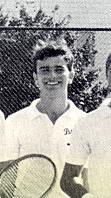MAX
Max Burstyn lived in the Jewish highlands on the other side of the public park from me. No flooding in the highlands, and 99-percent yidlach. Max spoke English, Yiddish and German. Max was born in Munich and came to America as a baby in the 1950s. His dad was a Galitzianer from Krakow.

Max Burstyn, 1969
I played tennis with Max in the park. That’s where we met. Max still rants about my neighborhood — the lowlands, the other side of park. He says, “You lived with the goys — like Stropki. I played Pony League with him. There were about eight Stropkis. What about Bobrowski? He was a Catholic too. Went to St. Joe’s. He played third-string for the Browns. He was from your street. There was Mastrobuono. He had a funny walk.”
Max was a mischling ersten grades, self-described. (First-degree mixed race.) That’s a Nazi term, but Max used it — at least around me. Max’s mother was a German gentile. Max’s father and mother met in Germany after the war. Max was halachically converted as a baby.
Max knows some strange Yiddish words. He mentions kudraychik — a swindler. I can’t find that in the dictionary. It’s probably Slavic, not Yiddish. Max says, “There was a kudraychik, a Jewish barber, in the occupied zone after the war . . .”
You don’t hear that kind of language, except around Max.
A groysn dank, Max.
—
Check out my essay, “Some Acts of God Are Better Than Others,” in the Wall Street Journal (12/3/20). The link, here, takes you over the WSJ paywall.




2 comments
Greatly enjoyed the wsj essay last week, gave me a lot of laughs, as all your work does. If insurance wont cover a damage, and it is too burdensome for you to pay for repairs/ construction, do you still have to provide temp housing for tenants?
To Joel:
Goes like this: My insurance covers my damages, less the 5K deductible, which comes out of my pocket.
Leave a Comment